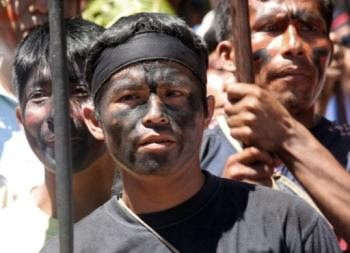Victor Figueroa Clark talks to Hugo Blanco, an ecosocialist and indigenous activist from Peru
Red Pepper magazine
Hugo Blanco is a native of Cuzco in Peru. An indigenous Quechua, he took an active part in the Peruvian peasant farmers’ struggles for agrarian reform in the 1960s. In 1963 he participated in the defence of lands seized by peasants and was imprisoned for several years before being sent into his first exile. He returned to Peru in 1975 but fell foul of the military government of General Bermúdez and was once more sent into exile. After his return in 1978 he was elected to the constituent assembly and later to the Peruvian parliament during the 1980s. In the 1990s he was again forced to leave Peru, threatened by both the Shining Path, a Maoist guerrilla movement, and the government security services. He has now returned to Peru and is currently editor of Lucha Indígena (Indigenous Struggle) a newspaper dedicated to the indigenous struggle across Latin America.
How did you become politically conscious and active?
I am from Cuzco, and there you could always see the tremendous abuses carried out against the indigenous population. And the area always had a tradition of struggle. I remember a teacher at primary school taught us indigenous protest songs, and we also saw theatrical plays about past struggles. So I think it was natural to come to this.
How are indigenous forms of organisation different to traditional left-wing forms of organisation?
There are no hierarchies. Although sometimes leaders emerge, or greedy people that hog the land, the essence is that we fight for a government by all. The indigenous communities that have survived for 500 years are collectivist political mechanisms. They are democratic and they have been recognised by several political constitutions. There are places where there are what could be called ‘communities of communities’, like in the Peruvian Amazon or in Cauca in Colombia. The Kuna in Panama are also recognised by the Panamanian government. The best example is that of Chiapas in Mexico, where a collective indigenous government has controlled the area for many years, and where leaders can be recalled.
How does the indigenous movement understand the concepts of progress and development?
Development hasn’t really reached the indigenous. They are those who least benefit from it. The system comes to exploit them and their land. They know much better than urban people that we are dependent on nature. Children in the developed world think potatoes come from the supermarket, but an indigenous person knows that he lives as part of nature and so when nature is attacked they must defend it.
Now, they might be able to use some elements of so-called civilization, but there is no comparison between these benefits and the damage done to nature. For example, you want to open a mine but it will poison the water and it will take water used for agriculture. This is absolutely lethal for the indigenous. For all the possible benefits that it might produce, such as jobs, schools or hospitals, it can’t substitute for life, and so they prefer to fight against it, and live without the mine.
What implications does this have for the progressive governments of Latin America? How are the indigenous interacting or conflicting with them over issues like these?
Well, firstly I think that they are definitely progressive governments. They confront imperialism and their national oligarchies, and much of their strength, especially in Bolivia and Ecuador, comes from the indigenous movement, and we defend them unconditionally.
But when they confront the indigenous we support the indigenous people. Not simply because they are indigenous, but because we consider them to be more democratic than the governments themselves are.
I think it is the governments that are acting in a contradictory manner. Yes they are progressive and anti-oligarchic and anti-imperialist, but they continue with extractive economic policies.
This is an aggression against their indigenous populations and these peoples have to defend themselves.
How does this indigenous struggle link to the so-called developed world? How international is it?
We have little to do with the struggles [in the UK], but we work with ecosocialists, and we identify completely with them because the indigenous struggle is ecosocialist. Although we don’t call it ecological or socialist, that is what it is in essence.
There was recently a meeting of Peruvian and Ecuadorean indigenous people up on the border, and they said, ‘Before we were divided, but now we will unite and fight the multinationals together.’
And we always have international meetings. The first meeting against neoliberalism and for humanity took place in Chiapas, called by the indigenous peoples there, long before the social forums, and now the constitutions of Bolivia and Ecuador define these countries as pluri-national and so states themselves are changing



No comments:
Post a Comment